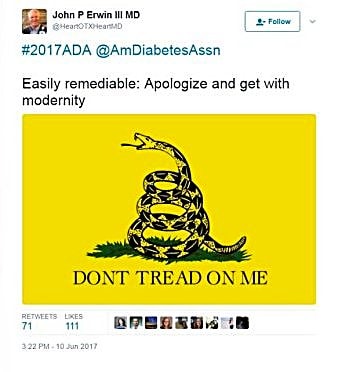The biggest story from the world's largest diabetes meeting was not a new scientific breakthrough. Instead, the lasting memory from the American Diabetes Association (ADA) 2017 Scientific Sessions will be the agonal breathing of the analog era of medicine.
Leaders of the ADA decided that the ideas, the facts, the science presented in San Diego must stay in San Diego, only later to be doled out in allotments and framing deemed acceptable to the $160-million-strong organization.
The ADA decided to enforce a strict photography ban during its sessions. Attendees who posted photos were publicly thanked for attending the meeting but then asked to delete their tweet. Multiple presenters interrupted their talks to admonish attendees to stop taking pictures of slides.
In a story on Medscape, the ADA referenced their strict photo-recording policy. This document is worth a look, especially the first and last paragraphs.
The ADA's Policy
The lead paragraph of the policy states that info shared during the meeting is often unpublished, and taking photos or recording content is considered intellectual piracy and unethical.
The final paragraph, however, says the ADA will take care of the recording tasks: "When registering for the meeting, all attendees granted ADA the right to use their name and likeness. In consideration for their participation in ADA's meeting, ADA was granted the perpetual, worldwide, royalty-free right and permission to record, photograph, use, and distribute (royalty-free, both now and in the future) all attendees' image, name, and voice in all forms and all media...without limitation."
Online pushback against this hierarchical policy of old was robust. The website Symplur, which tallies the signal of online conversations, reported that the top influencers from the ADA meeting were not diabetologists but cardiologists tweeting opposition to the photo ban.
The Policy Point by Point
Let's refute each of the ADAs reasons for its archaic policy:
First and foremost is its negative effects on the people who suffer from diabetes. The ADA website says 23 million Americans have diabetes and every 23 seconds another person is diagnosed with the condition. Notwithstanding the problem of overdiagnosis, diabetes is a major health problem.
Cardiologist Kevin Campbell captured the essence of the restriction of information with his Tweet:
"Many of those setting policy at @AmDiabetesAssn are executives making lots of cash….As a parent of a T1D kid I am ashamed of them."
Campbell is right. Any clinician who has attended a major medical meeting knows that the sharing of ideas and information makes you a better caregiver. In the era before the internet, one had to physically go the meeting. Now our connectivity allows ideas from meetings to flow to every part of the world. How are people with diabetes helped by stopping the flow of ideas?
This line of reasoning leads me to the notion of ethical behavior. ADA contends that taking pictures and recording presentations is unethical. The first definition of the adjective ethical relates to moral principles—the idea of right and wrong behavior.
I'm no ethicist, but by all standards, the sharing of ideas and information in picture form by meeting attendees seems far more right than wrong. But I guess that depends on your perspective. If your aim is to promote patient care, then spreading ideas seems right. If, on the other hand, your aim is to protect your revenue stream, then maybe sharing is not so right.
The unpublished-data argument is also ridiculous. Except for a handful of papers that are simultaneously published in journals, all abstracts and posters presented at any medical meeting are unpublished. The point of presenting data in a public forum is to share it, improve it, and move the field forward. If it's a trade secret, don't show it. If you are worried people could misconstrue your data, explain it better. If you are afraid dissenting views may gain traction, hone your argument.
Another argument that does not pass muster is the notion that a medical meeting is a forum for attendees only. In 2017, speaking to 10 people is no different from speaking to 10,000 or more people worldwide.
Maybe the ADA hasn't heard the news: humans are now digitally connected.
The solution to the issue of possibly being recorded or videoed is not to ban the device but rather to avoid saying or doing regretful things. The days when bombastic professors could proclaim things at medical meetings without consequence are over. If your slide won't stand up to public scrutiny, think twice about showing it.
Regular users of social media know this principle as self-evident. For better or worse, I think better, digital devices render our words and actions permanent and public.
The good news for the ADA is that the culture of the digital era makes it easy to fix the problem.
Gary Vaynerchuk, a media expert with almost 1.5 million followers on Twitter, teaches that in the online space, willingness to fail is rewarded. Being human is sticky. And what's more human than a sincere apology and admission of a mistake?
But an online reputation is not the only reason the ADA should apologize.
In a tweet to the ADA, Texas cardiologist John Erwin attached the words, "easily remediable: apologize and get with modernity," to the image of the Gadsden rattlesnake "Don't Tread on Me" Flag.

The iconic flag signifies a time when America fought for its freedom. And now it is information that fights to be free.
Erwin's point is well taken: those who try to curtail the freedom of information take the risk of incurring a stinging public rebuke—or worse: irrelevance.
Medscape © 2017
Any views expressed above are the author's own and do not necessarily reflect the views of WebMD or Medscape.
Cite this: John M. Mandrola. The Last Remnants of the Crumbling Ivory Tower: Social Media Changes Everything - Medscape - Jun 13, 2017.






Comments